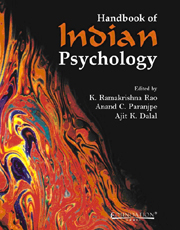Book contents
- Frontmatter
- Contents
- Contributing Authors
- Preface
- 01 Prologue: Introducing Indian Psychology
- 02 Indian Thought and Tradition: A Psychohistorical Perspective
- PART I SYSTEMS AND SCHOOLS
- PART II TOPICS AND THEMES
- PART III APPLICATIONS AND IMPLICATIONS
- 24 Therapeutic Psychology and Indian Yoga
- 25 Towards an Indian Organizational Psychology
- 26 Research on Indian Concepts of Psychology: Major Challenges and Perspectives for Future Action
- 27 Meditative Traditions and Contemporary Psychology
- 28 Consciousness Evolution of the Buddha until He Attained Satori
- 29 William James on Pure Experience and Samādhi in Sāṃkhya Yoga
- 30 Sri Ramaṇa Maharshi: A Case Study in Self-Realization
- 31 Altered States of Consciousness and the Spiritual Traditions: The Proposal for the Creation of State-Specific Sciences
- Pronunciation and Transliteration of Sanskrit Alphabet
- Glossary
- Index
29 - William James on Pure Experience and Samādhi in Sāṃkhya Yoga
from PART III - APPLICATIONS AND IMPLICATIONS
Published online by Cambridge University Press: 26 October 2011
- Frontmatter
- Contents
- Contributing Authors
- Preface
- 01 Prologue: Introducing Indian Psychology
- 02 Indian Thought and Tradition: A Psychohistorical Perspective
- PART I SYSTEMS AND SCHOOLS
- PART II TOPICS AND THEMES
- PART III APPLICATIONS AND IMPLICATIONS
- 24 Therapeutic Psychology and Indian Yoga
- 25 Towards an Indian Organizational Psychology
- 26 Research on Indian Concepts of Psychology: Major Challenges and Perspectives for Future Action
- 27 Meditative Traditions and Contemporary Psychology
- 28 Consciousness Evolution of the Buddha until He Attained Satori
- 29 William James on Pure Experience and Samādhi in Sāṃkhya Yoga
- 30 Sri Ramaṇa Maharshi: A Case Study in Self-Realization
- 31 Altered States of Consciousness and the Spiritual Traditions: The Proposal for the Creation of State-Specific Sciences
- Pronunciation and Transliteration of Sanskrit Alphabet
- Glossary
- Index
Summary
Western analytic philosophers who interpret William James tend to ignore his tripartite metaphysics of pragmatism, pluralism, and radical empiricism and focus instead on just his pragmatism (Taylor, 2005). Further, they tend to interpret James through the pragmatism of Peirce and Dewey instead of dealing with James in his own context. So it is no wonder that they would remain incredulous that any of James's ideas could have been somehow influenced by non-Western sources, such as the Hindu Darśana, since the philosophers might not be in full possession of what James actually meant in the first place. While we have no actual smoking gun on the matter, there is compelling circumstantial evidence to suggest that James's doctrine of pure experience, the heart of his metaphysic of radical empiricism, was influenced by his knowledge of Sāṃkhya philosophy.
The first question to address is what is James's tripartite metaphysics? Let me state in abbreviated form my conclusion that James's tripartite formula was a statement of his own unique philosophy but couched in the manner of Peirce's three categories. Aristotle had proposed a list of the basic and irreducible categories of existence; Kant, whom Peirce had studied intensely in the 1860s, had produced his own list. In 1867, Peirce himself delivered “On a new list of categories”, as one of the papers celebrating his election to the American Academy of Arts and Sciences at the young age of 26.
- Type
- Chapter
- Information
- Handbook of Indian Psychology , pp. 555 - 563Publisher: Foundation BooksPrint publication year: 2008
- 4
- Cited by

